

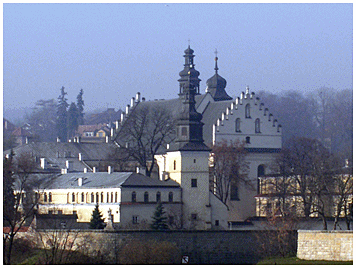
The Norbertine Sisters are the oldest female religious order in Poland. They have been present in Koscielna Wies in the north of Poland since 1126. In the south of Poland the Norbertine Sisters hail from Doksany, hence the name soror Doxanensis. Some say that the Norbertine nunnery in Zwierzyniec was founded in the existing Church of the Holy Saviour (built in the 12th century in about 1148 by Agnieszka, the wife of Polish Prince) Wladyslaw II Wygnaniec. Agnieszka`s sister, Gertruda (Wladyslaw II Czeski`s wife) founded the Norbertine convent in Doksany, near Prague in 1144. The other possible founder of the Zwierzyniec nunnery on the banks of the river Vistula is Jaksa Gryfita in 1162. The Norbertine Sisters are still living at this location. 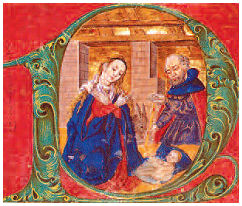 Prior to the partition of Poland there were 4 Norbertine monasteries (in Wroclaw, Hebdow, Witow and Nowy Sacz) and 11 convents: Strzelno, Zwierzyniec, Plock, Busko, Czarnowas, Zukowo, Imbramowice, Krzyzanowice and Leczyca, Boleslawice, as well as the Norbertine church and nunnery of Wislna St. in Cracow, founded in 1643 by the Prioress of Zwierzyniec Sister Dorota Kacka.
Prior to the partition of Poland there were 4 Norbertine monasteries (in Wroclaw, Hebdow, Witow and Nowy Sacz) and 11 convents: Strzelno, Zwierzyniec, Plock, Busko, Czarnowas, Zukowo, Imbramowice, Krzyzanowice and Leczyca, Boleslawice, as well as the Norbertine church and nunnery of Wislna St. in Cracow, founded in 1643 by the Prioress of Zwierzyniec Sister Dorota Kacka.
 The history of the convent in Cracow is closely tied to the history of Poland and the city: the Tartar incursions of 1241, 1259 and 1287; the Swedish invasions (1655 - 1657 and 1702 - 1709); floods and plagues; the Austrian, Prussian and Russian partitions; and the two world wars (1914 and 1939). The Norbertine Sisters survived, rebuilding the nunnery and their monastic life. They also played an important educational role, running a convent school before the introduction of State education. Many generations of Norbertine sisters were witnesses of the faith and of God`s love. Of special note were the Blessed Bronislawa (d. 1259), Judyta Krakowianka (d. 1255), Fabislawa 13th century, Malgorzata 13th century, Weronika (d. 1469), novice Zofia Lubomirska (d. 1637), Dorota Kacka (d. 1643), Anna Mlodziejowska and Anna Myszkowska who died at the hands of the Cossaks. There was also the Lords` servant Emilia Podoska (d. 1889) who gave her life for the rebirth of the Order. Blessed Bronislawa is the most popular saint in Krakow and Poland. She is the patron of children, youth, and the suffering. The original nunnery in Doksany was dissolved by Kaiser Joseph II in 1782. It was Father Wojciech Frejka of Strahov and Sister Michalina Andrusikiewicz who founded the Congregation of the Praemonstratensian Sisters in Svaty Kopecek near Olomoucz in 1902.
In 1905, Tsar Nicholas I issued an edict announcing tolerance for the Catholic Church. The Norbertine Sisters of Imbramowice re-opened the Novitiate, (founded in 1226), which had earlier been closed. The Zwierzyniec convent immediately sent aid in the form of 5 nuns. Sister Anzelma Wisnicka was Prioress there for three years. Father Sebastian Ráday, a Norbertine Canon Regular from Jaszov, and the above mentioned Sister Anzelma Wisnicka, founded the new Praemonstratensian Order in Kulsovat in Hungary in 1927.
The history of the convent in Cracow is closely tied to the history of Poland and the city: the Tartar incursions of 1241, 1259 and 1287; the Swedish invasions (1655 - 1657 and 1702 - 1709); floods and plagues; the Austrian, Prussian and Russian partitions; and the two world wars (1914 and 1939). The Norbertine Sisters survived, rebuilding the nunnery and their monastic life. They also played an important educational role, running a convent school before the introduction of State education. Many generations of Norbertine sisters were witnesses of the faith and of God`s love. Of special note were the Blessed Bronislawa (d. 1259), Judyta Krakowianka (d. 1255), Fabislawa 13th century, Malgorzata 13th century, Weronika (d. 1469), novice Zofia Lubomirska (d. 1637), Dorota Kacka (d. 1643), Anna Mlodziejowska and Anna Myszkowska who died at the hands of the Cossaks. There was also the Lords` servant Emilia Podoska (d. 1889) who gave her life for the rebirth of the Order. Blessed Bronislawa is the most popular saint in Krakow and Poland. She is the patron of children, youth, and the suffering. The original nunnery in Doksany was dissolved by Kaiser Joseph II in 1782. It was Father Wojciech Frejka of Strahov and Sister Michalina Andrusikiewicz who founded the Congregation of the Praemonstratensian Sisters in Svaty Kopecek near Olomoucz in 1902.
In 1905, Tsar Nicholas I issued an edict announcing tolerance for the Catholic Church. The Norbertine Sisters of Imbramowice re-opened the Novitiate, (founded in 1226), which had earlier been closed. The Zwierzyniec convent immediately sent aid in the form of 5 nuns. Sister Anzelma Wisnicka was Prioress there for three years. Father Sebastian Ráday, a Norbertine Canon Regular from Jaszov, and the above mentioned Sister Anzelma Wisnicka, founded the new Praemonstratensian Order in Kulsovat in Hungary in 1927. 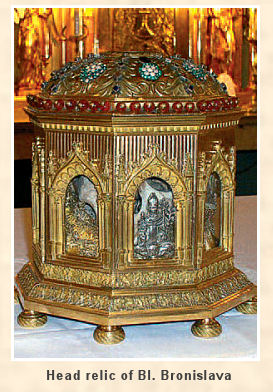 The period following the Second World War brought the difficult times of Communism to Eastern Europe. The Norbertines of Cracow continued to live in the convent. They shared their home, allocating part of the ground floor as classrooms to teach Religion to children and students. Father Abbot Michael Pojezdny and his brothers from Strahov inspired the revival of the contemplative Norbertine Order in Family of the Norbertine Sisters 2.
The period following the Second World War brought the difficult times of Communism to Eastern Europe. The Norbertines of Cracow continued to live in the convent. They shared their home, allocating part of the ground floor as classrooms to teach Religion to children and students. Father Abbot Michael Pojezdny and his brothers from Strahov inspired the revival of the contemplative Norbertine Order in Family of the Norbertine Sisters 2.
The sisters' convent 1134 NORBERTUS 2009 875 Doksany on 2 February 1998. Among the first sisters were two Norbertine nuns (s. Teresa and s. Alberta) and two Praemonstratensian nuns from the Czech Congregation (s. Franciszka and s. Pavla). Thanks to divine providence and the patronage of the Blessed Bronislawa, their Home, their convent and their community has been in existence since the 12th century. They strive to live under the charismatic influence of St. Norbert and believe that the good Lord will send the Order new challenges.
During the time of Communism the Sisters worked as a cottage industry, producing sweaters, embroidering, making puppets and dolls for children`s theatres. Some of the nuns still have pensions from this period. Their Convent church serves the parish of the Holy Saviour. Besides the convent and parish church there are four chapels. The nuns serve the church through prayer and work in which they care for the tidiness and cleanliness of liturgical robes and altar cloths, and decorate the altar with flowers. The nuns serve the poor who come to the convent gate, a service for which no charge is made. The Sisters carry out all necessary work in the convent and gardens. They serve all pilgrims who visit their church, the Sanctuary of the Blessed Bronislawa. They provide access to students, and allow academics to tour their old and rich archives.

Guests in the convent
They accept guests from their order, families and others.
Mission
Their special mission is prayer. They receive many telephone calls and letters, asking for the mediation and intercession of the Blessed Bronislawa and the Lord`s servant Emilia Podoska, in their prayers to God. The Sisters ask, give thanks and hope for the canonisation of Blessed Bronislawa
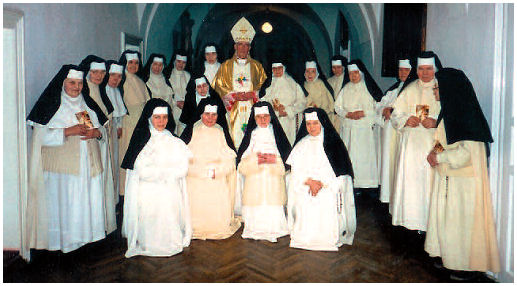 The community in the corridor of the convent | 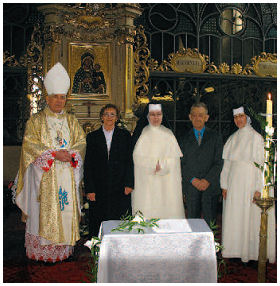 Sister professing first vows |
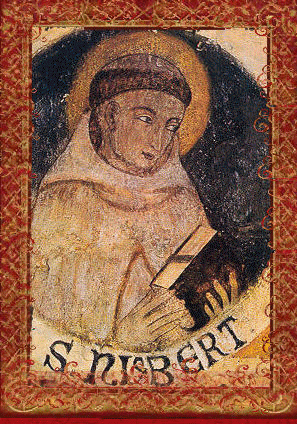











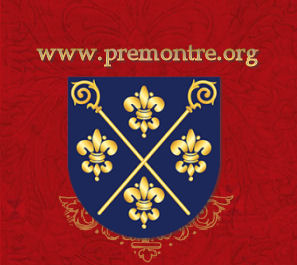
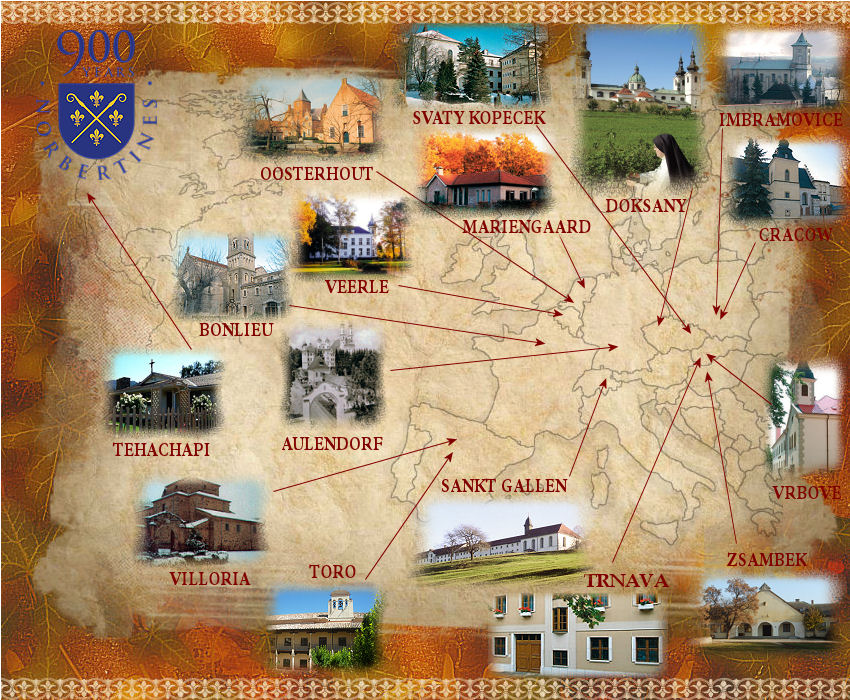
 |
| 

















 www.norbertinesisters.com
www.norbertinesisters.com